system
-
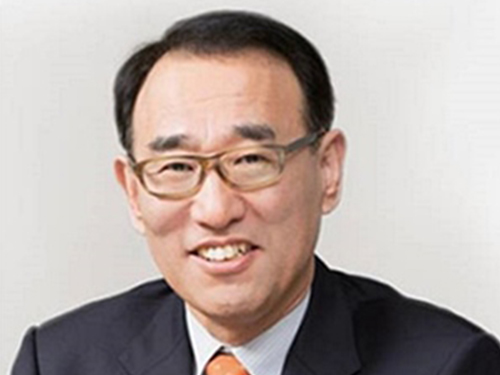 Professor Yim Decorated with the Chongjo Order of Merit
Professor Yong-Taek Yim from the Department of Mechanical Engineering was awarded the highest order of merit, the “Chongjo Keunjong Medal,” bestowed to public officials by the government in celebration of Invention Day on May 27.
Professor Yim was recognized for his innovative achievements to increase royalty income by introducing an IP-based management system at the Korean Institute of Machinery & Materials. He served as the president of KIMM for three years from 2014.
His idea led to new approaches to help explore diverse revenue creating sources such as dividend earnings and share sales, apart from simply relying on technology transfer fees. His efforts to disseminate the in-house R&D results also led to the foundation of six tech-based startups and spinoffs, which generated 11.2 billion KRW in sales. He also helped set up three spinoffs abroad.
Professor Yim said, “I pushed employee invention as a new value creator at KIMM. I thank each and every researcher and staff member at KIMM who worked so hard to create such an innovative IP-based R&D environment.”
2019.05.28 View 7767
Professor Yim Decorated with the Chongjo Order of Merit
Professor Yong-Taek Yim from the Department of Mechanical Engineering was awarded the highest order of merit, the “Chongjo Keunjong Medal,” bestowed to public officials by the government in celebration of Invention Day on May 27.
Professor Yim was recognized for his innovative achievements to increase royalty income by introducing an IP-based management system at the Korean Institute of Machinery & Materials. He served as the president of KIMM for three years from 2014.
His idea led to new approaches to help explore diverse revenue creating sources such as dividend earnings and share sales, apart from simply relying on technology transfer fees. His efforts to disseminate the in-house R&D results also led to the foundation of six tech-based startups and spinoffs, which generated 11.2 billion KRW in sales. He also helped set up three spinoffs abroad.
Professor Yim said, “I pushed employee invention as a new value creator at KIMM. I thank each and every researcher and staff member at KIMM who worked so hard to create such an innovative IP-based R&D environment.”
2019.05.28 View 7767 -
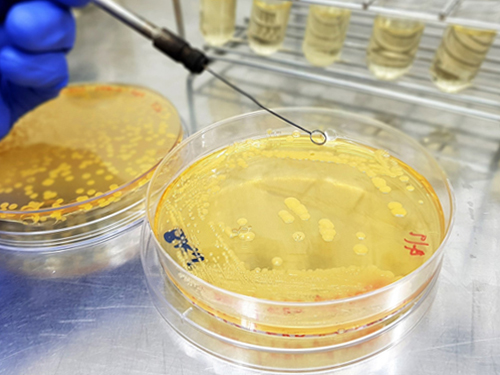 Engineered Microbial Production of Grape Flavoring
(Image 1: Engineered bacteria that produce grape flavoring.)
Researchers report a microbial method for producing an artificial grape flavor. Methyl anthranilate (MANT) is a common grape flavoring and odorant compound currently produced through a petroleum-based process that uses large volumes of toxic acid catalysts.
Professor Sang-Yup Lee’s team at the Department of Chemical and Biomolecular Engineering demonstrated production of MANT, a naturally occurring compound, via engineered bacteria. The authors engineered strains of Escherichia coli and Corynebacetrium glutamicum to produce MANT through a plant-based engineered metabolic pathway.
The authors tuned the bacterial metabolic pathway by optimizing the levels of AAMT1, the key enzyme in the process. To maximize production of MANT, the authors tested six strategies, including increasing the supply of a precursor compound and enhancing the availability of a co-substrate. The most productive strategy proved to be a two-phase extractive culture, in which MANT was extracted into a solvent. This strategy produced MANT on the scale of 4.47 to 5.74 grams per liter, a significant amount, considering that engineered microbes produce most natural products at a scale of milligrams or micrograms per liter.
According to the authors, the results suggest that MANT and other related molecules produced through industrial processes can be produced at scale by engineered microbes in a manner that would allow them to be marketed as natural one, instead of artificial one.
This study, featured at the Proceeding of the National Academy of Sciences of the USA on May 13, was supported by the Technology Development Program to Solve Climate Changes on Systems Metabolic Engineering for Biorefineries from the Ministry of Science and ICT.
(Image 2. Overview of the strategies applied for the microbial production of grape flavoring.)
2019.05.15 View 56037
Engineered Microbial Production of Grape Flavoring
(Image 1: Engineered bacteria that produce grape flavoring.)
Researchers report a microbial method for producing an artificial grape flavor. Methyl anthranilate (MANT) is a common grape flavoring and odorant compound currently produced through a petroleum-based process that uses large volumes of toxic acid catalysts.
Professor Sang-Yup Lee’s team at the Department of Chemical and Biomolecular Engineering demonstrated production of MANT, a naturally occurring compound, via engineered bacteria. The authors engineered strains of Escherichia coli and Corynebacetrium glutamicum to produce MANT through a plant-based engineered metabolic pathway.
The authors tuned the bacterial metabolic pathway by optimizing the levels of AAMT1, the key enzyme in the process. To maximize production of MANT, the authors tested six strategies, including increasing the supply of a precursor compound and enhancing the availability of a co-substrate. The most productive strategy proved to be a two-phase extractive culture, in which MANT was extracted into a solvent. This strategy produced MANT on the scale of 4.47 to 5.74 grams per liter, a significant amount, considering that engineered microbes produce most natural products at a scale of milligrams or micrograms per liter.
According to the authors, the results suggest that MANT and other related molecules produced through industrial processes can be produced at scale by engineered microbes in a manner that would allow them to be marketed as natural one, instead of artificial one.
This study, featured at the Proceeding of the National Academy of Sciences of the USA on May 13, was supported by the Technology Development Program to Solve Climate Changes on Systems Metabolic Engineering for Biorefineries from the Ministry of Science and ICT.
(Image 2. Overview of the strategies applied for the microbial production of grape flavoring.)
2019.05.15 View 56037 -
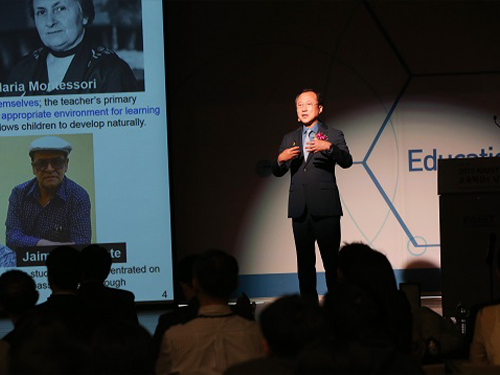 Education Innovation Day Reaffirms Rewarding of Excellence
Professors Tae-Eog Lee and Il-Chul Moon from the Department of Industrial & Systems Engineering received the Linkgenesis Best Teacher Award and the Soo-Young Lee Teaching Innovation Award on May 10. They were each awarded with 10 million KRW in prize money during the Education Innovation Day ceremony held at the Chung Kun-mo conference hall.
The award was endowed by KAIST Alumni Scholarship Chairman Hyung-Kyu Lim and KAIST Foundation Chairman Soo-Young Lee to support the innovation initiative and acknowledge faculty members who made significant contributions to educational innovation and benefited the general public though their innovations.
“KAIST’s vision for excellence and commitment to innovation is a game changer. Educational innovation is one of five pillars of Vision 2031, and it is our priority to foster critical and creative thinking students,” said President Sung-Chul Shin at the ceremony. All the awardees made presentation on their innovative projects and shared their ideas on better pedagogical methodology for next generation.
Professor Lee, dean of the KAIST Academy and the head of the Center for Excellence in Learning & Teaching was recognized for his contribution to enhancing educational quality through innovative learning and teaching methodology development. He has set up an Education 3.0 Initiative, an online education platform for flipped learning at KAIST.
Professor Moon also upgraded the online education platform to the 4.0 version and extended KAIST’s massive online courses through KOOC framework. This open platform offers more than 62 courses, with more than 170 thousand users registered since 2014.
Professor Song-Hong Park from the Department of Bio and Brain Engineering and Professor Jae-Woo Lee from the Department of Chemical and Biomolecular Engineering also won the Excellence Award.
2019.05.10 View 9340
Education Innovation Day Reaffirms Rewarding of Excellence
Professors Tae-Eog Lee and Il-Chul Moon from the Department of Industrial & Systems Engineering received the Linkgenesis Best Teacher Award and the Soo-Young Lee Teaching Innovation Award on May 10. They were each awarded with 10 million KRW in prize money during the Education Innovation Day ceremony held at the Chung Kun-mo conference hall.
The award was endowed by KAIST Alumni Scholarship Chairman Hyung-Kyu Lim and KAIST Foundation Chairman Soo-Young Lee to support the innovation initiative and acknowledge faculty members who made significant contributions to educational innovation and benefited the general public though their innovations.
“KAIST’s vision for excellence and commitment to innovation is a game changer. Educational innovation is one of five pillars of Vision 2031, and it is our priority to foster critical and creative thinking students,” said President Sung-Chul Shin at the ceremony. All the awardees made presentation on their innovative projects and shared their ideas on better pedagogical methodology for next generation.
Professor Lee, dean of the KAIST Academy and the head of the Center for Excellence in Learning & Teaching was recognized for his contribution to enhancing educational quality through innovative learning and teaching methodology development. He has set up an Education 3.0 Initiative, an online education platform for flipped learning at KAIST.
Professor Moon also upgraded the online education platform to the 4.0 version and extended KAIST’s massive online courses through KOOC framework. This open platform offers more than 62 courses, with more than 170 thousand users registered since 2014.
Professor Song-Hong Park from the Department of Bio and Brain Engineering and Professor Jae-Woo Lee from the Department of Chemical and Biomolecular Engineering also won the Excellence Award.
2019.05.10 View 9340 -
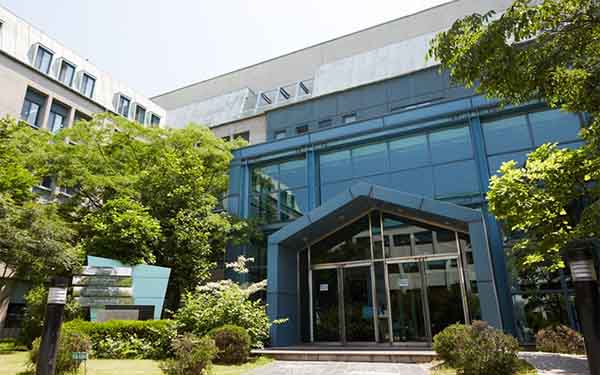 KAIST Earns AACSB Business School Accreditation
The KAIST College of Business re-earned business school accreditation from the Association to Advance Collegiate Schools of Business (AACSB) International. The school first earned the accreditation in 2003, and has continued to receive the accreditation four consecutive times. Currently only 5% of the 16,000 business schools around the world have earned AACSB accreditation. KAIST received a good evaluation for the competitive research of its faculty, its executive education programs based on strong industry-academia ties, and specialized MBA and master’s program, which includes programs such as social entrepreneurship and green business and policy.Alexander Triantis, dean of the Robert H. Smith School of Business at the University of Maryland and a judge for AACSB Accreditation said, “I was impressed to see students from KAIST have a high standard of knowledge. A number of its graduates continue to be appointed as professors of top universities abroad, which shows its strong global competence”. AACSB was founded in 1916 by deans of business colleges from prestigious universities such as Harvard University, Stanford University and Columbia University, to provide business and accounting accreditation to universities. Evaluation for AACSB accreditation takes place every five years. Schools are evaluated based on fifteen standards, including student admission and graduation requirements, student-faculty ratios, faculty’s intellectual contributions, research infrastructure, global cooperation, and industry-academia programs. They can be eligible for re-accreditation if they satisfy the conditions offered by AACSB International and are committed to continuous improvement every five years. KAIST also earned the accreditation from the European Foundation for Management Development Quality Improvement System (EQUIS) three consecutive times since 2010. In 2013, it earned membership into the Partnership in International Management (PIM). Membership is only possible for those who have AACSB and EQUIS accreditation and they can be listed as a candidate school through voting. The candidate schools can finally earn membership after one year of strict screening. As of January 2019, there are 65 prestigious graduate schools of business, including KAIST, listed as PIM members.
2019.02.01 View 6437
KAIST Earns AACSB Business School Accreditation
The KAIST College of Business re-earned business school accreditation from the Association to Advance Collegiate Schools of Business (AACSB) International. The school first earned the accreditation in 2003, and has continued to receive the accreditation four consecutive times. Currently only 5% of the 16,000 business schools around the world have earned AACSB accreditation. KAIST received a good evaluation for the competitive research of its faculty, its executive education programs based on strong industry-academia ties, and specialized MBA and master’s program, which includes programs such as social entrepreneurship and green business and policy.Alexander Triantis, dean of the Robert H. Smith School of Business at the University of Maryland and a judge for AACSB Accreditation said, “I was impressed to see students from KAIST have a high standard of knowledge. A number of its graduates continue to be appointed as professors of top universities abroad, which shows its strong global competence”. AACSB was founded in 1916 by deans of business colleges from prestigious universities such as Harvard University, Stanford University and Columbia University, to provide business and accounting accreditation to universities. Evaluation for AACSB accreditation takes place every five years. Schools are evaluated based on fifteen standards, including student admission and graduation requirements, student-faculty ratios, faculty’s intellectual contributions, research infrastructure, global cooperation, and industry-academia programs. They can be eligible for re-accreditation if they satisfy the conditions offered by AACSB International and are committed to continuous improvement every five years. KAIST also earned the accreditation from the European Foundation for Management Development Quality Improvement System (EQUIS) three consecutive times since 2010. In 2013, it earned membership into the Partnership in International Management (PIM). Membership is only possible for those who have AACSB and EQUIS accreditation and they can be listed as a candidate school through voting. The candidate schools can finally earn membership after one year of strict screening. As of January 2019, there are 65 prestigious graduate schools of business, including KAIST, listed as PIM members.
2019.02.01 View 6437 -
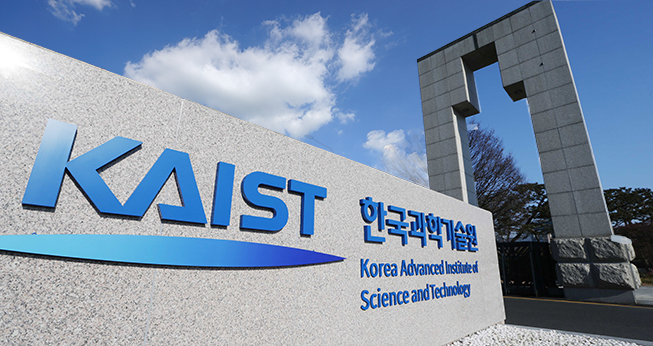 OUIC Presents the Six Most Promising Techs Transferrable to Local SMEs
KAIST will showcase the six most promising technologies for small and medium enterprises (SMEs) on November 14 in the Academic Cultural Complex. To strengthen the competitive edge of local SMEs in Daejeon, the Office of University-Industry made a survey of their technological needs and came up with the six most promising technologies. Developers will introduce their technologies during the session.Besides the introduction of the promising technologies, the session will also provide a program named University to Business (U2B) to match up technologies according to the SMEs’ needs. SMEs who wish to engage in technology transfers can receive counseling and other support programs during the session.First, Professor Seok-Hyung Bae from the Department of Industrial Design will present a technology for controlling cooperation robots. Professor Bae inserted flexible materials between the controllers to allow robots to use both hands stably and operate more accurately and swiftly. It can be applied to automatic robots, industrial robots, and service robots.Professor Hyun Myung from the Department of Civil & Environmental Engineering will demonstrate a robot navigation system in a dynamic indoor and outdoor environment, which can be applied to robotics in logistics, smart factories, and autonomous vehicles. Providing robust simultaneous localization and mapping systems, this technology shows high-performing navigation with low-cost sensors.Meanwhile, Professor Siyoung Choi from the Department of Chemical and Biomolecular Engineering will introduce a technology for forming stable adhesive emulsions. An emulsion is a stable mixture of water and oil. Conventionally, a small amount of surfactant is added to stabilize an emulsion. Here, Professor Choi developed a stable emulsion system without using any chemical substances. This technology can be applied to various fields, including the cosmetics, pharmaceutical, semiconductor, and painting industries. The session will also present smart IoTs platform technology developed by Professor Jinhong Yang from the KAIST Institute for IT Convergence. His technology minimizes errors occurring when multiple IoT devices are connected simultaneously. Professor Yong Keun Park from the Department of Physics will introduce a technology for measuring glycated hemoglobin by using the optical properties of red blood cells. This technology can be applied to make low-cost, small-sized measuring equipment. It can also be used for vitro diagnoses including diabetes, cardiovascular disorders, tumors, kidney disease, and infectious diseases. Professor Yong Man Ro from the School of Electrical Engineering will show technology for biometric access control. Conventional technologies for face recognition fall behind other biometrics. Professor Ro and his team developed a facial dynamics interpreting network which allows very accurate facial recognition by interpreting the relationships between facial local dynamics and estimating facial traits. This technology can be applied to security and communication in finance, computers, and information system.KAIST President Sung-Chul Shin said, “KAIST will continue to support SMEs to have stronger competitiveness in the market. Through technology transfer, we will drive innovation in technological commercialization where a university’s research and development creates economic value.”
2018.11.13 View 9593
OUIC Presents the Six Most Promising Techs Transferrable to Local SMEs
KAIST will showcase the six most promising technologies for small and medium enterprises (SMEs) on November 14 in the Academic Cultural Complex. To strengthen the competitive edge of local SMEs in Daejeon, the Office of University-Industry made a survey of their technological needs and came up with the six most promising technologies. Developers will introduce their technologies during the session.Besides the introduction of the promising technologies, the session will also provide a program named University to Business (U2B) to match up technologies according to the SMEs’ needs. SMEs who wish to engage in technology transfers can receive counseling and other support programs during the session.First, Professor Seok-Hyung Bae from the Department of Industrial Design will present a technology for controlling cooperation robots. Professor Bae inserted flexible materials between the controllers to allow robots to use both hands stably and operate more accurately and swiftly. It can be applied to automatic robots, industrial robots, and service robots.Professor Hyun Myung from the Department of Civil & Environmental Engineering will demonstrate a robot navigation system in a dynamic indoor and outdoor environment, which can be applied to robotics in logistics, smart factories, and autonomous vehicles. Providing robust simultaneous localization and mapping systems, this technology shows high-performing navigation with low-cost sensors.Meanwhile, Professor Siyoung Choi from the Department of Chemical and Biomolecular Engineering will introduce a technology for forming stable adhesive emulsions. An emulsion is a stable mixture of water and oil. Conventionally, a small amount of surfactant is added to stabilize an emulsion. Here, Professor Choi developed a stable emulsion system without using any chemical substances. This technology can be applied to various fields, including the cosmetics, pharmaceutical, semiconductor, and painting industries. The session will also present smart IoTs platform technology developed by Professor Jinhong Yang from the KAIST Institute for IT Convergence. His technology minimizes errors occurring when multiple IoT devices are connected simultaneously. Professor Yong Keun Park from the Department of Physics will introduce a technology for measuring glycated hemoglobin by using the optical properties of red blood cells. This technology can be applied to make low-cost, small-sized measuring equipment. It can also be used for vitro diagnoses including diabetes, cardiovascular disorders, tumors, kidney disease, and infectious diseases. Professor Yong Man Ro from the School of Electrical Engineering will show technology for biometric access control. Conventional technologies for face recognition fall behind other biometrics. Professor Ro and his team developed a facial dynamics interpreting network which allows very accurate facial recognition by interpreting the relationships between facial local dynamics and estimating facial traits. This technology can be applied to security and communication in finance, computers, and information system.KAIST President Sung-Chul Shin said, “KAIST will continue to support SMEs to have stronger competitiveness in the market. Through technology transfer, we will drive innovation in technological commercialization where a university’s research and development creates economic value.”
2018.11.13 View 9593 -
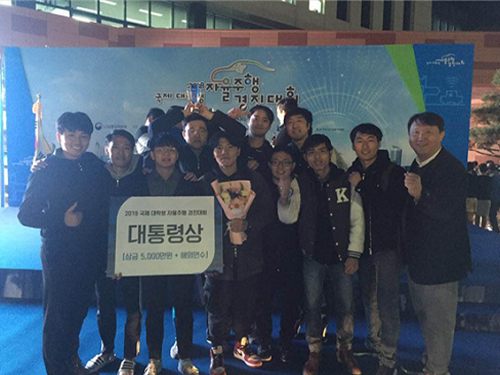 Team KAT Wins the Autonomous Car Challenge
(Team KAT receiving the Presidential Award)
A KAIST team won the 2018 International Autonomous Car Challenge for University Students held in Daegu on November 2.
Professor Seung-Hyun Kong from the ChoChunShik Graduate School of Green Transportation and his team participated in this contest with the team named KAT (KAIST Autonomous Technologies). The team received the Presidential Award with a fifty million won cash prize and an opportunity for a field trip abroad.
The competition was conducted on actual roads with Connected Autonomous Vehicles (CAV), which incorporate autonomous driving technologies and vehicle-to-everything (V2X) communication system.
In this contest, the autonomous vehicles were given a mission to pick up passengers or parcels. Through the V2X communication, the contest gave current location of the passengers or parcels, their destination, and service profitability according to distance and level of service difficulty.
The participating vehicles had to be equipped very accurate and robust navigation system since they had to drive on narrow roads as well as go through tunnels where GPS was not available. Moreover, they had to use camera-based recognition technology that was invulnerable to backlight as the contest was in the late afternoon.
The contest scored the mission in the following way: the vehicles get points if they pick up passengers and safely drop them off at their destination; on the other hand, points are deducted when they violate lanes or traffic lights. It will be a major black mark if a participant sitting in the driver’s seat needs to get involved in driving due to a technical issue.
Youngbo Shim of KAT said, “We believe that we got major points for technical superiority in autonomous driving and our algorithm for passenger selection.”
This contest, hosted by Ministry of Trade, Industry and Energy, was the first international competition for autonomous driving on actual roads. A total of nine teams participated in the final contest, four domestic teams and five teams allied with overseas universities such as Tsinghua University, Waseda University, and Nanyang Technological University.
Professor Kong said, “There is still a long way to go for fully autonomous vehicles that drive flexibly under congested traffic conditions. However, we will continue to our research in order to achieve high-quality autonomous driving technology.”
(Team KAT getting ready for the challenge)
2018.11.06 View 12474
Team KAT Wins the Autonomous Car Challenge
(Team KAT receiving the Presidential Award)
A KAIST team won the 2018 International Autonomous Car Challenge for University Students held in Daegu on November 2.
Professor Seung-Hyun Kong from the ChoChunShik Graduate School of Green Transportation and his team participated in this contest with the team named KAT (KAIST Autonomous Technologies). The team received the Presidential Award with a fifty million won cash prize and an opportunity for a field trip abroad.
The competition was conducted on actual roads with Connected Autonomous Vehicles (CAV), which incorporate autonomous driving technologies and vehicle-to-everything (V2X) communication system.
In this contest, the autonomous vehicles were given a mission to pick up passengers or parcels. Through the V2X communication, the contest gave current location of the passengers or parcels, their destination, and service profitability according to distance and level of service difficulty.
The participating vehicles had to be equipped very accurate and robust navigation system since they had to drive on narrow roads as well as go through tunnels where GPS was not available. Moreover, they had to use camera-based recognition technology that was invulnerable to backlight as the contest was in the late afternoon.
The contest scored the mission in the following way: the vehicles get points if they pick up passengers and safely drop them off at their destination; on the other hand, points are deducted when they violate lanes or traffic lights. It will be a major black mark if a participant sitting in the driver’s seat needs to get involved in driving due to a technical issue.
Youngbo Shim of KAT said, “We believe that we got major points for technical superiority in autonomous driving and our algorithm for passenger selection.”
This contest, hosted by Ministry of Trade, Industry and Energy, was the first international competition for autonomous driving on actual roads. A total of nine teams participated in the final contest, four domestic teams and five teams allied with overseas universities such as Tsinghua University, Waseda University, and Nanyang Technological University.
Professor Kong said, “There is still a long way to go for fully autonomous vehicles that drive flexibly under congested traffic conditions. However, we will continue to our research in order to achieve high-quality autonomous driving technology.”
(Team KAT getting ready for the challenge)
2018.11.06 View 12474 -
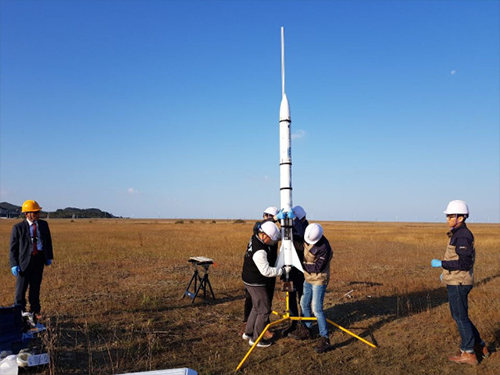 KAIST Launches Woorisae II
Professor Sejin Kwon from the Department of Aerospace Engineering and his team succeeded in launching a science rocket, named ‘Woorisae II’ at Saemanguem reclamation. This rocket was developed in collaboration with the Satellite Technology Research Lab (SaRTec).
The test-firing was conducted at 10:43 am on Sunday October 28, 2018 (35°N 42’ 06” 126°E 33’ 36”, Radius of 0.6NM). This launch was the follow-up to the previous launch that was cancelled due to not gaining approval for using the airspace.
Professor Kwon’s team put a great deal of effort into securing the land for the rocket launch. As a result, they got approval from the Saemangeum Development and Investment Agency for the land and the Ministry of Land, Infrastructure and Transport for the use of the airspace. The Republic of Korea Air Force and United States Air Force also approved the use of the airspace for the launch of the science rocket for research purposes.
Woorisae II is 2.2 meters long with a diameter of 20cm, and weighs 13kg without a payload. The rocket is powered by a hybrid rocket with hydrogen peroxide oxidizer producing 100 kg of force. The Woorisae II sounding rocket was designed to burn for five seconds and then continue inertial flight for 20 seconds. The target altitude of Woorisae II was set at 3,300 feet to comply with the airspace approval.
The team developed the core components, including a hybrid rocket propulsion system, flight computer and parachute recovery system, as well as a ground control station. The flight data was transmitted to the ground station and recorded to onboard computer memory.
When a malfunction occurs during the flight, Woorisae II was designed to terminate the power flight for safety by shutting the propellant valve and deploying the recovery parachute. All the rocket subsystems and components were developed and supplied by domestic startup companies such as INOCOM and NARA SPACE TEHCNOLOGY.
Generally, sounding rockets reach an altitude beyond 30km and are widely used for testing rocket engines and reentry materials as well as for conducting microgravity experiments. Instruments for atmospheric science can also be installed to measure fine dust and high altitude atmosphere. Besides these science and technology purposes, most advanced spacefaring countries have sounding rocket programs to train and educate young people in the field of space science.
Professor Kwon said, “We will plan to launch upgraded rockets on November 4 and December 6 because we already received approval from the related agencies for using this land and airspace. Based on the experiment, we are planning to develop a cost-efficient small launch vehicle that is capable of delivering a cube satellite into Earth’s orbit.”
(Photos of preparing the rocket launch)
2018.10.29 View 11073
KAIST Launches Woorisae II
Professor Sejin Kwon from the Department of Aerospace Engineering and his team succeeded in launching a science rocket, named ‘Woorisae II’ at Saemanguem reclamation. This rocket was developed in collaboration with the Satellite Technology Research Lab (SaRTec).
The test-firing was conducted at 10:43 am on Sunday October 28, 2018 (35°N 42’ 06” 126°E 33’ 36”, Radius of 0.6NM). This launch was the follow-up to the previous launch that was cancelled due to not gaining approval for using the airspace.
Professor Kwon’s team put a great deal of effort into securing the land for the rocket launch. As a result, they got approval from the Saemangeum Development and Investment Agency for the land and the Ministry of Land, Infrastructure and Transport for the use of the airspace. The Republic of Korea Air Force and United States Air Force also approved the use of the airspace for the launch of the science rocket for research purposes.
Woorisae II is 2.2 meters long with a diameter of 20cm, and weighs 13kg without a payload. The rocket is powered by a hybrid rocket with hydrogen peroxide oxidizer producing 100 kg of force. The Woorisae II sounding rocket was designed to burn for five seconds and then continue inertial flight for 20 seconds. The target altitude of Woorisae II was set at 3,300 feet to comply with the airspace approval.
The team developed the core components, including a hybrid rocket propulsion system, flight computer and parachute recovery system, as well as a ground control station. The flight data was transmitted to the ground station and recorded to onboard computer memory.
When a malfunction occurs during the flight, Woorisae II was designed to terminate the power flight for safety by shutting the propellant valve and deploying the recovery parachute. All the rocket subsystems and components were developed and supplied by domestic startup companies such as INOCOM and NARA SPACE TEHCNOLOGY.
Generally, sounding rockets reach an altitude beyond 30km and are widely used for testing rocket engines and reentry materials as well as for conducting microgravity experiments. Instruments for atmospheric science can also be installed to measure fine dust and high altitude atmosphere. Besides these science and technology purposes, most advanced spacefaring countries have sounding rocket programs to train and educate young people in the field of space science.
Professor Kwon said, “We will plan to launch upgraded rockets on November 4 and December 6 because we already received approval from the related agencies for using this land and airspace. Based on the experiment, we are planning to develop a cost-efficient small launch vehicle that is capable of delivering a cube satellite into Earth’s orbit.”
(Photos of preparing the rocket launch)
2018.10.29 View 11073 -
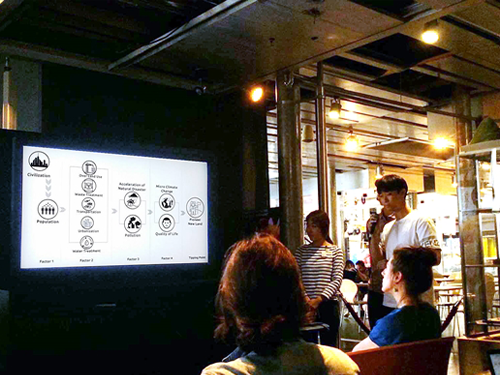 Participation in the 2018 Bio-Digital City Workshop in Paris
(A student make a presentatiion during the Bio-Digital City Workshop in Paris last month.)
KAIST students explored ideas for developing future cities during the 2018 Bio-Digital City Workshop held in Paris last month.
This international workshop hosted by Cité des Sciences et de l'Industrie was held under the theme “Biomimicry, Digital City and Big Data.” During the workshop from July 10 to July 20, students teamed up with French counterparts to develop innovative urban design ideas. Cité des Sciences et de l'Industrie is the largest science museum in Europe and is operated by Universcience, a specialized institute of science and technology in France.
Professor Seongju Chang from the Department of Civil and Environmental Engineering and Professor Jihyun Lee of the Graduate School of Culture Technology Students led the students group.
Participants presented their ideas and findings on new urban solutions that combine biomimetic systems and digital technology. Each student group analyzed a special natural ecosystem such as sand dunes, jellyfish communities, or mangrove forests and conducted research to extract algorithms for constructing sustainable urban building complexes based on the results. The extracted algorithm was used to conceive a sustainable building complex forming a part of the urban environment by applying it to the actual Parisian city segment given as the virtual site for the workshop.
Students from diverse background in both countries participated in this convergence workshop. KAIST students included Ph.D. candidate Hyung Min Cho, undergraduates Min-Woo Jeong, Seung-Hwan Cha, and Sang-Jun Park from the Department of Civil and Environmental Engineering, undergraduate Kyeong-Keun Seo from the Department of Materials Science and Engineering, JiWhan Jeong (Master’s course) from the Department of Industrial and Systems Engineering, Ph.D. candidate Bo-Yoon Zang from the Graduate School of Culture Technology. They teamed up with French students from diverse backgrounds, including Design/Science, Visual Design, Geography, Computer Science and Humanities and Social Science.
This workshop will serve as another opportunity to expand academic and human exchange efforts in the domain of smart and sustainable cities with Europe in the future as the first international cooperation activity of KAIST and the Paris La Villette Science Museum.
Professor Seong-Ju Chang who led the research group said, "We will continue to establish a cooperative relationship between KAIST and the European scientific community. This workshop is a good opportunity to demonstrate the competence of KAIST students and their scientific and technological excellence on the international stage.”
2018.08.01 View 11647
Participation in the 2018 Bio-Digital City Workshop in Paris
(A student make a presentatiion during the Bio-Digital City Workshop in Paris last month.)
KAIST students explored ideas for developing future cities during the 2018 Bio-Digital City Workshop held in Paris last month.
This international workshop hosted by Cité des Sciences et de l'Industrie was held under the theme “Biomimicry, Digital City and Big Data.” During the workshop from July 10 to July 20, students teamed up with French counterparts to develop innovative urban design ideas. Cité des Sciences et de l'Industrie is the largest science museum in Europe and is operated by Universcience, a specialized institute of science and technology in France.
Professor Seongju Chang from the Department of Civil and Environmental Engineering and Professor Jihyun Lee of the Graduate School of Culture Technology Students led the students group.
Participants presented their ideas and findings on new urban solutions that combine biomimetic systems and digital technology. Each student group analyzed a special natural ecosystem such as sand dunes, jellyfish communities, or mangrove forests and conducted research to extract algorithms for constructing sustainable urban building complexes based on the results. The extracted algorithm was used to conceive a sustainable building complex forming a part of the urban environment by applying it to the actual Parisian city segment given as the virtual site for the workshop.
Students from diverse background in both countries participated in this convergence workshop. KAIST students included Ph.D. candidate Hyung Min Cho, undergraduates Min-Woo Jeong, Seung-Hwan Cha, and Sang-Jun Park from the Department of Civil and Environmental Engineering, undergraduate Kyeong-Keun Seo from the Department of Materials Science and Engineering, JiWhan Jeong (Master’s course) from the Department of Industrial and Systems Engineering, Ph.D. candidate Bo-Yoon Zang from the Graduate School of Culture Technology. They teamed up with French students from diverse backgrounds, including Design/Science, Visual Design, Geography, Computer Science and Humanities and Social Science.
This workshop will serve as another opportunity to expand academic and human exchange efforts in the domain of smart and sustainable cities with Europe in the future as the first international cooperation activity of KAIST and the Paris La Villette Science Museum.
Professor Seong-Ju Chang who led the research group said, "We will continue to establish a cooperative relationship between KAIST and the European scientific community. This workshop is a good opportunity to demonstrate the competence of KAIST students and their scientific and technological excellence on the international stage.”
2018.08.01 View 11647 -
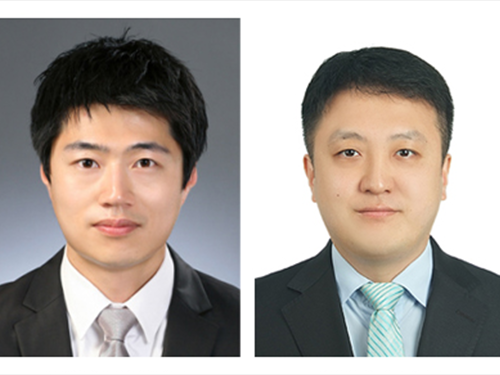 KAISTians Receive Future Ocean Science and Technology Awards
(From left: PhD candidates Minseok Kang and Junkeon Ahn)
PhD candidates Minseok Kang and Junkeon Ahn from the Department of Mechanical Engineering received Future Ocean Science and Technology Awards from the Korean Association of Ocean Science and Technology Societies (KAOSTS).
Since 2017, KAOSTS has conferred this award upon graduate students who have published outstanding papers on ocean science and technology in order to encourage young researchers in this area.
Kang published ‘Ship block assembly sequence planning considering productivity and welding deformation’ in Naval Architecture and Ocean Engineering in which he proposed an assembly sequence planning method for block assemblies that considers the geometric characteristics of blocks to determine feasible assembly sequences as well as assembly process and productivity factors.
Ahn published ‘Fuzzy-based FMEA of hybrid MCFC and gas turbine system for marine propulsion’ in Power Sources. In this research, he conducted a study proposing a fuzzy-based failure mode and effect analysis (FMEA) for a hybrid molten carbonate fuel cell and gas turbine system for liquefied hydrogen tankers.
2018.06.15 View 8419
KAISTians Receive Future Ocean Science and Technology Awards
(From left: PhD candidates Minseok Kang and Junkeon Ahn)
PhD candidates Minseok Kang and Junkeon Ahn from the Department of Mechanical Engineering received Future Ocean Science and Technology Awards from the Korean Association of Ocean Science and Technology Societies (KAOSTS).
Since 2017, KAOSTS has conferred this award upon graduate students who have published outstanding papers on ocean science and technology in order to encourage young researchers in this area.
Kang published ‘Ship block assembly sequence planning considering productivity and welding deformation’ in Naval Architecture and Ocean Engineering in which he proposed an assembly sequence planning method for block assemblies that considers the geometric characteristics of blocks to determine feasible assembly sequences as well as assembly process and productivity factors.
Ahn published ‘Fuzzy-based FMEA of hybrid MCFC and gas turbine system for marine propulsion’ in Power Sources. In this research, he conducted a study proposing a fuzzy-based failure mode and effect analysis (FMEA) for a hybrid molten carbonate fuel cell and gas turbine system for liquefied hydrogen tankers.
2018.06.15 View 8419 -
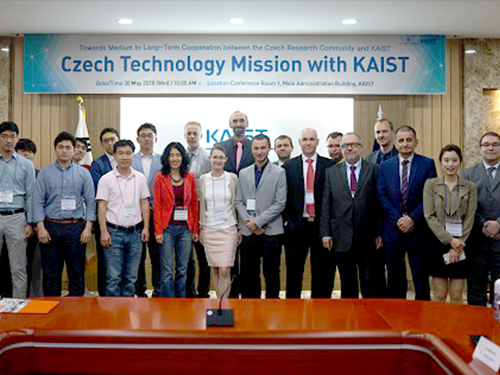 Czech Technology Mission with KAIST
Members of the Czech research community visited KAIST to discuss medium to long-term cooperation with KAIST. This visit was hosted by the Fourth Industrial Revolution Intelligence Center (FIRIC).
The community is comprised of people from Czech enterprises and academic institutes that are leading core technologies for the Fourth Industrial Revolution in the fields of AI, robotics, and biotechnology. They had a chance to meet KAIST professors and visit research labs.
Professor Il-Doo Kim from the Department of Materials Science and Engineering, Professor Seongsu Kim from the Department of Mechanical Engineering, and Professor Hyun Uk Kim from the Department of Chemical and Biomolecular Engineering attended the meeting, which took place in the Mechatronics, Systems, and Control Lab under the Vice President for Planning and Budget Soo Hyun Kim and Professor Kyung Soo Kim from the Department of Mechanical Engineering.
Professor Petr Novák from the Technical University of Ostrava said, “It was a meaningful meeting to help understand research trends on industrial robots in Korea.” Professor So Young Kim from FIRIC said, “The Czech research community is strong in basic research where KAIST has outstanding source technology. I hope this visit will open up a path for medium to long-term cooperation on sharing research and technology know-how between the Czech research community and KAIST.”
2018.06.07 View 7222
Czech Technology Mission with KAIST
Members of the Czech research community visited KAIST to discuss medium to long-term cooperation with KAIST. This visit was hosted by the Fourth Industrial Revolution Intelligence Center (FIRIC).
The community is comprised of people from Czech enterprises and academic institutes that are leading core technologies for the Fourth Industrial Revolution in the fields of AI, robotics, and biotechnology. They had a chance to meet KAIST professors and visit research labs.
Professor Il-Doo Kim from the Department of Materials Science and Engineering, Professor Seongsu Kim from the Department of Mechanical Engineering, and Professor Hyun Uk Kim from the Department of Chemical and Biomolecular Engineering attended the meeting, which took place in the Mechatronics, Systems, and Control Lab under the Vice President for Planning and Budget Soo Hyun Kim and Professor Kyung Soo Kim from the Department of Mechanical Engineering.
Professor Petr Novák from the Technical University of Ostrava said, “It was a meaningful meeting to help understand research trends on industrial robots in Korea.” Professor So Young Kim from FIRIC said, “The Czech research community is strong in basic research where KAIST has outstanding source technology. I hope this visit will open up a path for medium to long-term cooperation on sharing research and technology know-how between the Czech research community and KAIST.”
2018.06.07 View 7222 -
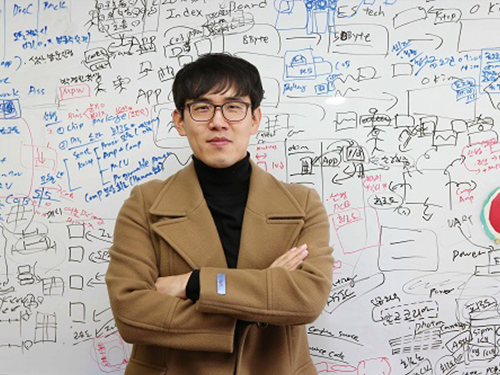 Professor Hojong Chang Wins the Best Paper Award at ISIITA 2018
Professor Hojong Chang from the KAIST Institute won the best paper award at the International Symposium on Innovation in Information Technology and Application (ISIITA) 2018.
ISIITA is a global networking symposium in which leading researchers in the field of information technology and applications gather to exchange knowledge on technological convergence.
Professor Chang won the prize for his paper, titled ‘A Study on the Measurement of Aptamer in Urine Using SiPM’.
This paper proposes using aptamer to measure and analyze the density of sodium and potassium contained in urine, allowing diseases to be diagnosed in advance.
Professor Chang said, “With a point-of-care test system that facilitates a quick diagnosis without extra processes, such as centrifugation, it is possible to get an early diagnosis and check infection in real time. Through generalizing this crucial technology, we expect to develop adequate technology for enhancing quality of life.
2018.02.12 View 8699
Professor Hojong Chang Wins the Best Paper Award at ISIITA 2018
Professor Hojong Chang from the KAIST Institute won the best paper award at the International Symposium on Innovation in Information Technology and Application (ISIITA) 2018.
ISIITA is a global networking symposium in which leading researchers in the field of information technology and applications gather to exchange knowledge on technological convergence.
Professor Chang won the prize for his paper, titled ‘A Study on the Measurement of Aptamer in Urine Using SiPM’.
This paper proposes using aptamer to measure and analyze the density of sodium and potassium contained in urine, allowing diseases to be diagnosed in advance.
Professor Chang said, “With a point-of-care test system that facilitates a quick diagnosis without extra processes, such as centrifugation, it is possible to get an early diagnosis and check infection in real time. Through generalizing this crucial technology, we expect to develop adequate technology for enhancing quality of life.
2018.02.12 View 8699 -
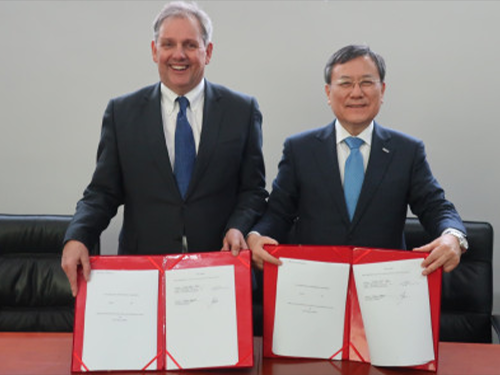 KAIST to Host the THE Innovation & Impact Summit in 2019
KAIST and Times Higher Education (THE) agreed to co-host the THE Innovation & Impact Summit at KAIST from April 1 to 3, 2019.
Global leaders from higher education, government, and industry will gather at KAIST to discuss how universities can better innovate for creating a greater impact.
(from left: THE Managing Director Trevor Barratt and KAIST President Sung-Chul Shin)
President Sung-Chul Shin and Trevor Barratt, managing director at the THE, signed an agreement to host the 2019 THE Innovation & Impact Summit at KAIST next April. The agreement was signed on February 6 during the THE Asia Universities Summit held at SUSTech in Shenzhen in China. Phil Baty, editorial director at the THE was also present during the agreement.
By hosting the 2019 THE Innovation & Impact Summit, KAIST has a chance to introduce its innovative research and performance and its educational environment and startup ecosystem to the world. Having educational and industrial leaders meet at KAIST will add more power to the global status and capacity of KAIST.
The THE Innovation & Impact Summit, first held in 2017, is one in the seven presidential summit series held by THE. During the second summit at KAIST, THE will launch their world university innovation rankings for the first time.
As innovation at universities and its impact have been a crucial indicator in building an institutional brand and reputation, leading universities are gearing up to encourage startups and entrepreneurship education. Even more, innovation at universities is emerging as one of the growth engines of economies.
The innovation indicators of KAIST have been highly recognized by many global ranking institutions in terms of the volume of patents and the patents-to-article citation impact. Thomson Reuters has recognized KAIST for two consecutive years as the most innovative university in Asia, and sixth in the world.
President Shin has high expectations for the hosting of the Innovation & Impact Summit at KAIST. He explained, “Innovation makes up the DNA of KAIST and it has been our institutional mission from the start in 1971. KAIST was commissioned to make innovation for industrialization and economic development through education and research. I do not see any university more suitable than KAIST to host this innovation summit. I hope the summit at KAIST will serve as a global platform to provide very creative ideas for making innovation and collaboration among the leading universities for all the participants.”
Meanwhile, at the THE Asia Universities Summit in Shenzhen, how to respond to the implications of the Fourth Industrial Revolution was the key agenda piercing the two-day sessions.
As a panelist, President Shin shared his experiences on innovative strategies viable for spearheading university reform for the Fourth Industrial Revolution, along with Vice-Chancellor of the University of Sheffield Sir Keith Burnett, President of Monash University Margaret Gardner, and President of Hong Kong Polytechnic University President Timothy W. Tong. He said that universities should foster young talents by equipping them with creativity, collaboration, and convergent minds. To swiftly respond to the new industrial environment, President Shin said that universities should remove the high barriers between departments and establish cross- and inter-disciplinary education systems, convergence research and technology commercialization.
2018.02.06 View 9649
KAIST to Host the THE Innovation & Impact Summit in 2019
KAIST and Times Higher Education (THE) agreed to co-host the THE Innovation & Impact Summit at KAIST from April 1 to 3, 2019.
Global leaders from higher education, government, and industry will gather at KAIST to discuss how universities can better innovate for creating a greater impact.
(from left: THE Managing Director Trevor Barratt and KAIST President Sung-Chul Shin)
President Sung-Chul Shin and Trevor Barratt, managing director at the THE, signed an agreement to host the 2019 THE Innovation & Impact Summit at KAIST next April. The agreement was signed on February 6 during the THE Asia Universities Summit held at SUSTech in Shenzhen in China. Phil Baty, editorial director at the THE was also present during the agreement.
By hosting the 2019 THE Innovation & Impact Summit, KAIST has a chance to introduce its innovative research and performance and its educational environment and startup ecosystem to the world. Having educational and industrial leaders meet at KAIST will add more power to the global status and capacity of KAIST.
The THE Innovation & Impact Summit, first held in 2017, is one in the seven presidential summit series held by THE. During the second summit at KAIST, THE will launch their world university innovation rankings for the first time.
As innovation at universities and its impact have been a crucial indicator in building an institutional brand and reputation, leading universities are gearing up to encourage startups and entrepreneurship education. Even more, innovation at universities is emerging as one of the growth engines of economies.
The innovation indicators of KAIST have been highly recognized by many global ranking institutions in terms of the volume of patents and the patents-to-article citation impact. Thomson Reuters has recognized KAIST for two consecutive years as the most innovative university in Asia, and sixth in the world.
President Shin has high expectations for the hosting of the Innovation & Impact Summit at KAIST. He explained, “Innovation makes up the DNA of KAIST and it has been our institutional mission from the start in 1971. KAIST was commissioned to make innovation for industrialization and economic development through education and research. I do not see any university more suitable than KAIST to host this innovation summit. I hope the summit at KAIST will serve as a global platform to provide very creative ideas for making innovation and collaboration among the leading universities for all the participants.”
Meanwhile, at the THE Asia Universities Summit in Shenzhen, how to respond to the implications of the Fourth Industrial Revolution was the key agenda piercing the two-day sessions.
As a panelist, President Shin shared his experiences on innovative strategies viable for spearheading university reform for the Fourth Industrial Revolution, along with Vice-Chancellor of the University of Sheffield Sir Keith Burnett, President of Monash University Margaret Gardner, and President of Hong Kong Polytechnic University President Timothy W. Tong. He said that universities should foster young talents by equipping them with creativity, collaboration, and convergent minds. To swiftly respond to the new industrial environment, President Shin said that universities should remove the high barriers between departments and establish cross- and inter-disciplinary education systems, convergence research and technology commercialization.
2018.02.06 View 9649